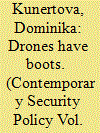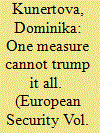| Srl | Item |
| 1 |
ID:
192531


|
|
|
|
|
| Summary/Abstract |
Before Russia’s 2022 invasion of Ukraine, security studies scholars were myopic about small drones’ enabling functions and tactical benefits. They were preoccupied with drone impacts on international security and the ethical dimensions of counterterrorism drone strikes. Similarly, literature on the revolution in military affairs has examined emerging drone technologies based on their strategic advantages. “Low-tech” drone innovations have received less attention. The war has highlighted the collective magnitude of these omissions. At first, scholars followed extant predictions by concluding that large drones did not revolutionize warfare, proliferated slowly, and were too costly and complex to operate. Yet, one year into the war, thousands of drones—scouts, loitering grenades, drone bomblets, and suicide drones—are defying the field’s assumptions of their uselessness sans air superiority. Contrary to most theoretical expectations, small drones in Ukraine are changing battlefield dynamics from lower airspace. Scholars must begin to study drone diversity in modern wars.
|
|
|
|
|
|
|
|
|
|
|
|
|
|
|
|
| 2 |
ID:
155695


|
|
|
|
|
| Summary/Abstract |
This paper calls for a qualitative turn in discussing NATO burden-sharing. The paper takes issue with the numerical burden-sharing narrative in NATO and identifies its two main problems. Despite being simple, the 2% defence spending pledge lacks other basic attributes of any contributory system: fairness and effectiveness. Drawing from concepts of distributive justice, the paper analyses NATO’s first burden-sharing debates and demonstrates that due to their qualitatively different capabilities, the allies agreed on an egalitarian ability-to-pay distributive justice. Furthermore, it shows that the allies refrained from implementing fairness in terms of a one-size-fits-all formula, since this simple numerical approach could not produce fair and effective burden-sharing at the same time. Rather, they developed a dynamic framework for optimal sharing. These formative burden-sharing debates provide valuable lessons learned for the current build-up of NATO’s posture: less focused on formal sharing, more concerned with strategic outputs.
|
|
|
|
|
|
|
|
|
|
|
|
|
|
|
|